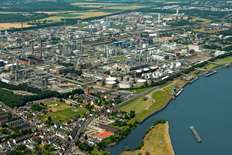- A 15 million euro plant is under construction in Dormagen, Germany.
- The plant aims to start operations at the beginning of next year.
- The production line will produce 5,000 metric tons of polyols annually.
- CO2 will replace some petroleum in the production of polyurethane foam.

Project Overview
Bayer MaterialScience is constructing a new production line in Dormagen, Germany, to manufacture plastics using CO2. A key component, a 25 metric ton chemical reactor, has been installed, and the final major part, a CO2 tank, will be added in the fall. The 15 million euro plant is on schedule to start operations early next year, completing construction in just over a year.
Production Capacity
The new line will produce polyols, essential for making foam, with an annual capacity of 5,000 metric tons. These innovative polyols will contain approximately 20% CO2 and will initially be used in polyurethane foam mattresses.
CO2 as a Raw Material
Tests have shown that CO2-based materials are as effective as conventional products. By replacing some petroleum with CO2, the project aims to reduce reliance on fossil fuels and meet the growing demand for sustainable products. The plastics industry has long sought alternative raw materials to address these issues.
Research and Development
Scientific groundwork was necessary to use CO2 in plastics production. Bayer MaterialScience collaborated with the CAT Catalytic Center at Aachen University to find a suitable catalyst for the chemically inert CO2. The research continues, with goals to increase the CO2 proportion in products and expand the range of CO2-based plastics.

